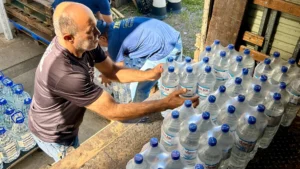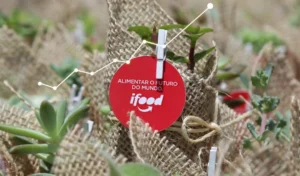To reduce the use of plastic in deliveries, in July 2021 the iFood signed the #DeLivreDePlástico commitment, organized by United Nations Environment Program (UNEP), the main environmental authority in the United Nations (UN) system, and for Oceana, the largest NGO focused on ocean protection.
Just over a year after making the commitment, iFood carried out a study to quantify the packaging used in deliveries and, thus, understand what your specific goals would be to reduce the use of plastic in delivery and move on to the next stage of the commitment: the specific definition of goals for disposable packaging, sachets and plastic bags.
Using its own, unprecedented methodology, the company sought data from partner restaurants and markets to measure the use of plastic — it discovered that 27% of the packaging used in deliveries is plastic and 1.3% of the waste generated by an order comes from plastic bags.
This study was fundamental for consolidating the goals of the #DeLivreDePlástico campaign, explains Fabiane Staschower, Sustainability specialist at iFood. Based on these results, iFood's new commitments for 2025 are:
- Have 100% of restaurants on the platform giving users the option to select whether or not they wish to receive sachets of condiments with their order;
- Reduce the percentage of single-use plastic packaging in your operation by 50%, from 27% to 13.5%, based on the volume generated in 2021.
- Reduce the percentage of single-use plastic bags in your operation by 23%, from 1.3% to 1%, based on the volume generated in 2021.
By the end of 2022, iFood commits to:
- Implement a solution to reduce the sending of condiment sachets to 5% from the restaurant base;
- Have 100% of its own market stores making plastic-free deliveries;
- Guarantee the use of 500 thousand sustainable packaging through direct sales via iFood Shop and/or direct negotiation with partner restaurants, as a pilot in the implementation of plastic-free packaging in the market
According to Fabiane, the commitment to reducing single-use plastic in operations is one of the pillars of iFood in its quest to contribute to the environment, through sustainability actions. “We understand that, today, there are many problems with plastic, especially the misuse of the material. That’s why we decided to make this commitment,” he says. “It’s quite audacious, but teaming up with UNEP and Oceana means having forces that contribute to meeting this great challenge.”
What has iFood done to eliminate plastic pollution in deliveries?
O iFood Regenerates is iFood's environmental goals program that aims to reduce plastic pollution in delivery operations and neutralize carbon emissions by 2025. There are several initiatives promoted by the program that seek solutions to avoid the use of plastic. Are they:
Friends of Nature
With the “Friends of Nature” campaign, the iFood app now gives customers the option of not having to send forks, spoons, knives and plastic straws when placing an order. So far, 40% of restaurants have joined the initiative, resulting in more than 300 million orders shipped without plastic items and avoiding the use of 510 tons of plastic cutlery and straws.
Sustainable packaging
To accelerate the reduction in the use of disposable plastic in deliveries and offer sustainable solutions for replacing packaging, Fabiane explains that iFood has been looking for alternatives with partners, such as Suzano, Klabin and the growPack.
In a action at Rock in Rio, in September 2022, iFood made more than 230 thousand sustainable packaging available to restaurants at the music festival, made from recyclable 100% paper, with raw materials from renewable, biodegradable and plastic-free sources. The calls “Packaging of the Future” were developed in partnership with Suzano and, after the event, 61 thousand units of the product were allocated to some restaurants, with the aim of gaining market share.
“Soon, we will launch a pilot for testing with a packaging made from corn husks, developed in partnership with growPack”, explains Fabiane. In addition, iFood also seeks moisture-resistant plastic-free bag solutions for refrigerated products.
These studies are important because they offer alternatives to plastic materials — after all, to eliminate the use of these polluting packaging, it is necessary to be able to replace them with sustainable options.
What about recycling?
With the aim of strengthening the recycling chain and giving the correct destination to waste, iFood implemented 80 PEVs (Voluntary Delivery Point) in Rio de Janeiro, São Paulo and Bahia. Another initiative is the Recycle Bot, an environmental education tool that answers questions about sustainability via WhatsApp.
The project I've Been Bag, in partnership with Greening and Retalhar, collects iFood backpacks that are no longer in usable condition and transforms the material into new products, such as bags and fanny packs, or even fuel for industry. Between 2020 and 2021, 124 tons of bags have already been recovered instead of going to landfill.


